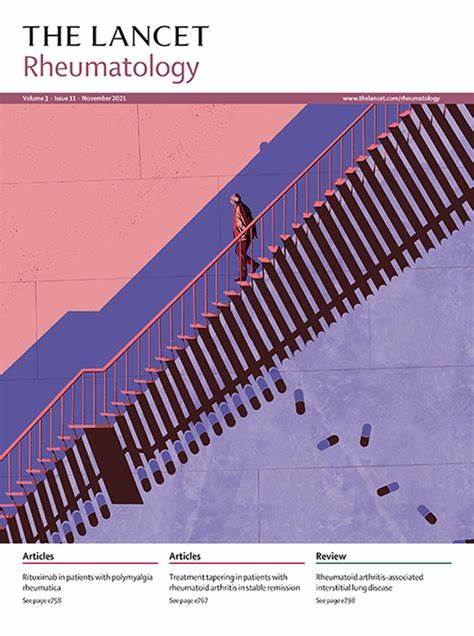钠钾泵α1亚基AT1A1的母体自身抗体与胎儿自身免疫性先天性心脏传导阻滞:一项病例对照研究
IF 16.4
1区 医学
Q1 RHEUMATOLOGY
引用次数: 0
摘要
背景:胎儿自身免疫性先天性心脏传导阻滞是一种罕见但危及生命且难以预测的疾病。本研究旨在确定一种血清学生物标志物,预测因母体系统性红斑狼疮、Sjögren病、未分化结缔组织病或有先天性心脏传导阻滞后代病史的孕妇自身免疫性先天性心脏传导阻滞的风险。方法:本病例对照研究分析了来自两个中心(加拿大病童医院和意大利帕多瓦大学)的受自身免疫性先天性心脏传导阻滞影响和未受其影响的孕妇的血液样本。收集不同胎龄的血清样本用于生物标志物的发现、验证和确认。关键纳入标准为产妇anti-Sjögren综合征相关抗原a /Ro自身抗体临床检测阳性,关键排除标准为伴有心脏传导阻滞的结构性先天性心脏病。病例是导致胎儿或新生儿先天性心脏传导阻滞的妊娠,对照组是导致后代心律正常的妊娠。利用胎儿心脏组织和干细胞来源的心肌细胞,采用二维western blotting技术鉴定靶向胎儿心脏蛋白的母体自身抗体。使用商业蛋白质验证了研究结果。使用受体工作特征曲线评估预测胎儿心脏传导阻滞结果的敏感性和特异性。主要研究结果是自身免疫性先天性心脏传导阻滞病例与对照组中抗心脏自身抗体的存在和特异性,特异性自身抗体与先天性心脏传导阻滞发展之间的关联,以及已鉴定的自身抗体的预测准确性。这项研究的设计和实施没有涉及到有生活经验的个体。结果:在2010年1月1日至2020年12月31日期间,发现队列(病童医院)收集了血清样本;在1999年8月1日至2019年12月31日期间,验证队列(帕多瓦大学医院)收集了血清样本;在2018年6月1日至2023年8月31日期间,验证队列(病童医院)收集了血清样本。发现队列的平均产妇年龄为34.2岁(SD为5.2),验证队列为33.5岁(SD为4.6),验证队列为32.8岁(SD为4.3)。胎儿自身免疫性先天性心脏传导阻滞孕妇血清样本(例;与未受影响的妊娠相比,N =46)显示抗心脏自身抗体的范围扩大(对照;n = 65)。质谱分析鉴定了11个潜在的心脏蛋白靶点,并在受影响孕妇的血清样本中证实了7个自身抗体的存在。在先天性心脏传导阻滞发生前确定了四个靶点(ANXA1、BIP、MYPC3和AT1A1)。早在妊娠7周就检测到针对Na+和K+ atp酶α1亚型(AT1A1)的母体自身抗体,并且存在于所有有或没有胎儿心脏传导阻滞史的母亲的妊娠中(发现组6例中有6例[100%],验证组22例中有22例[100%],验证组16例中有16例[100%])。无胎心传导阻滞史的孕妇在所有未受影响的妊娠中均不存在抗at1a1自身抗体(54/65[83%])。解释:本研究确定了一种新的靶向胎儿AT1A1心脏蛋白的母体自身抗体,作为一种潜在的生物标志物,可以早期准确地检测以前没有受影响妊娠的孕妇的胎儿自身免疫性先天性心脏传导阻滞。这一进展可能通过加强监测和及时和知情的治疗干预来改善高危妊娠的母胎管理。资助:加拿大心脏和中风基金会和加拿大卫生研究院。本文章由计算机程序翻译,如有差异,请以英文原文为准。
Maternal autoantibodies to the sodium potassium pump α1 subunit AT1A1 and fetal autoimmune congenital heart block: a case-control study
Background
Fetal autoimmune congenital heart block is a rare but life-threatening condition that is difficult to predict. This study sought to identify a serological biomarker predictive of autoimmune congenital heart block in pregnancies at risk due to maternal systemic lupus erythematosus, Sjögren's disease, undifferentiated connective tissue disease, or a history of congenital heart block offspring.
Methods
This case-control study analysed maternal blood samples from pregnancies affected and unaffected by autoimmune congenital heart block from two centres (The Hospital for Sick Children, Canada, and The University of Padua, Italy). Serum samples collected across varying gestational ages were used for biomarker discovery, verification, and validation. The key inclusion criterion was a positive clinical test for maternal anti-Sjögren's syndrome-related antigen A/Ro autoantibodies, and the key exclusion criterion was structural congenital heart disease associated with heart block. Cases were pregnancies that resulted in fetal or neonatal congenital heart block and controls were pregnancies that resulted in offspring with a normal heart rhythm. Two-dimensional western blotting was used to identify maternal autoantibodies targeting fetal cardiac proteins, using fetal heart tissue and stem-cell-derived cardiomyocytes. Findings were validated using commercial proteins. Sensitivity and specificity for predicting fetal heart block outcomes were assessed using receiver-operating characteristic curves. The primary study outcomes were the presence and specificity of anti-cardiac autoantibodies in autoimmune congenital heart block cases versus controls, the association between specific autoantibodies and congenital heart block development, and the predictive accuracy of identified autoantibodies. This study did not involve individuals with lived experience in the study design or implementation.
Findings
Serum samples were collected between Jan 1, 2010, and Dec 31, 2020, in the discovery cohort (The Hospital for Sick Children), between Aug 1, 1999, and Dec 31, 2019 in the verification cohort (University Hospital of Padua), and between June 1, 2018, and Aug 31, 2023, in the validation cohort (The Hospital for Sick Children). Mean maternal age was 34·2 years (SD 5·2) in the discovery cohort, 33·5 years (4·6) in the verification cohort, and 32·8 years (4·3) in the validation cohort. Maternal serum samples from pregnancies affected by fetal autoimmune congenital heart block (cases; n=46) showed an expanded repertoire of anti-cardiac autoantibodies compared with unaffected pregnancies (controls; n=65). Mass spectrometry identified 11 potential cardiac protein targets for maternal autoantibodies and the presence of seven autoantibodies were confirmed in serum samples from affected pregnancies. Four targets were identified before the onset of congenital heart block (ANXA1, BIP, MYPC3, and AT1A1). Maternal autoantibodies against the Na+ and K+ ATPase α1 isoform (AT1A1) were detected as early as 7 weeks gestation and were present in all affected pregnancies of mothers with and without previous fetal heart block history (six [100%] of six in the discovery cohort, 22 [100%] of 22 in the verification cohort, and 16 [100%] of 16 in the validation cohort). Anti-AT1A1 autoantibodies were absent in all unaffected pregnancies in pregnant women with no fetal heart block history (54/65 [83%]).
Interpretation
This study identifies a novel maternal autoantibody targeting the fetal AT1A1 cardiac protein as a potential biomarker for the early and accurate detection of fetal autoimmune congenital heart block in pregnant women who had not previously had an affected pregnancy. This advancement might improve the maternal–fetal management of at-risk pregnancies through enhanced surveillance and timely and informed therapeutic interventions.
Funding
Heart and Stroke Foundation of Canada and Canadian Institutes of Health Research.
求助全文
通过发布文献求助,成功后即可免费获取论文全文。
去求助
来源期刊

Lancet Rheumatology
RHEUMATOLOGY-
CiteScore
34.70
自引率
3.10%
发文量
279
期刊介绍:
The Lancet Rheumatology, an independent journal, is dedicated to publishing content relevant to rheumatology specialists worldwide. It focuses on studies that advance clinical practice, challenge existing norms, and advocate for changes in health policy. The journal covers clinical research, particularly clinical trials, expert reviews, and thought-provoking commentary on the diagnosis, classification, management, and prevention of rheumatic diseases, including arthritis, musculoskeletal disorders, connective tissue diseases, and immune system disorders. Additionally, it publishes high-quality translational studies supported by robust clinical data, prioritizing those that identify potential new therapeutic targets, advance precision medicine efforts, or directly contribute to future clinical trials.
With its strong clinical orientation, The Lancet Rheumatology serves as an independent voice for the rheumatology community, advocating strongly for the enhancement of patients' lives affected by rheumatic diseases worldwide.
 求助内容:
求助内容: 应助结果提醒方式:
应助结果提醒方式:


